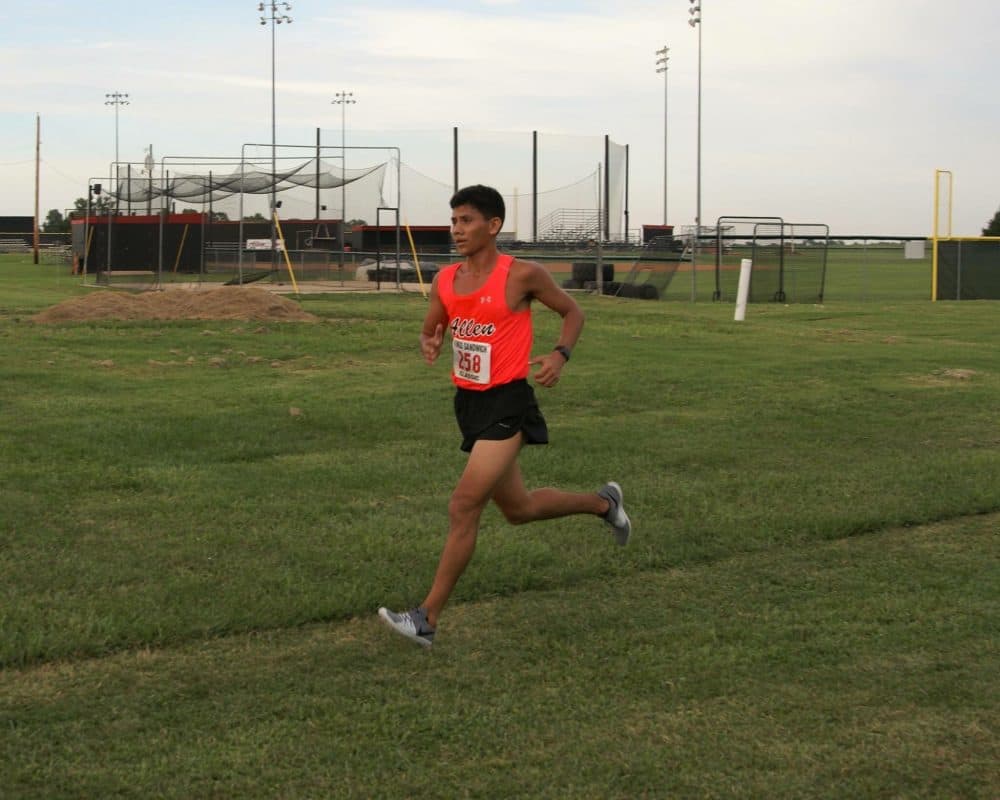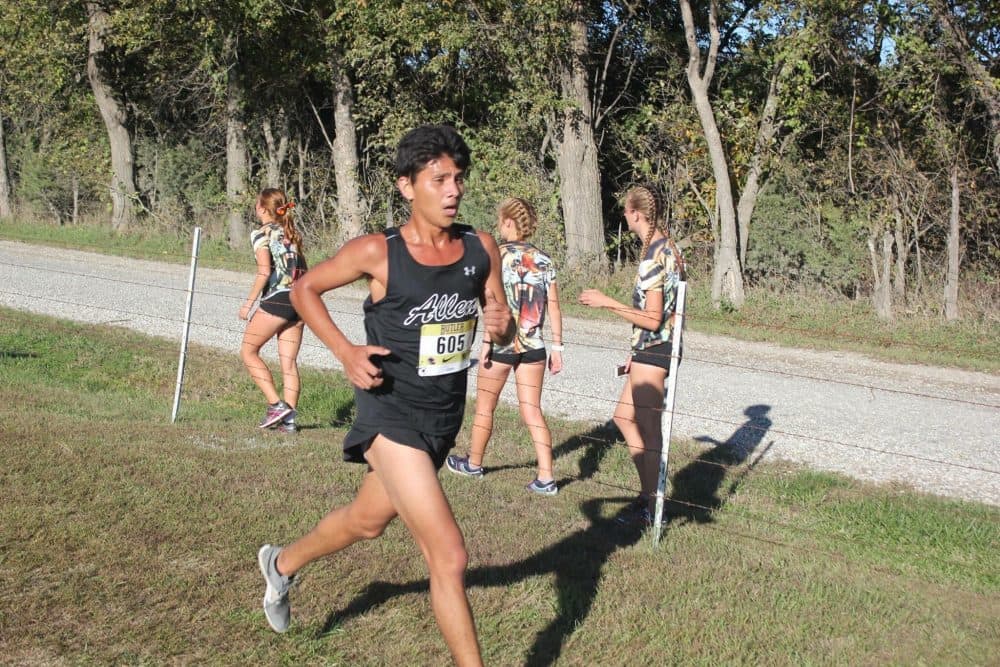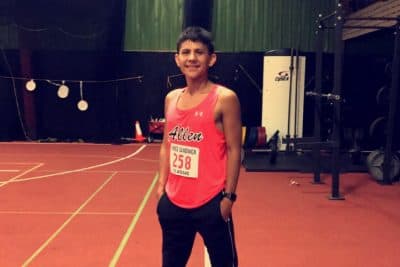Advertisement
'I Find An Obstacle, I Overcome It': Jose Reza Runs For His Family, Future

Jose Reza came to Immokalee, Florida, a community full of immigrants without papers, when he was 15. His mother, Guillermina, brought him out of Mexico because there were bodies of young men hanging in the street in the town where they lived. She was afraid for her son’s life. Both Jose and Guillermina are undocumented.
Jose came to our attention because he’s a runner who found in his sport a series of opportunities, and if this story is beginning to sound familiar, it’s because I told a little bit of it a year ago on this program.
Jose’s prospects started improving just as he was finishing high school in 2016.
"That day of my graduation that I told her, 'Hey, Mom, it’s not over,'" Jose recalls. "'I’m going to college. It’s possible now. It’s not just a dream.'"
Jose’s determination to make his dreams reality encouraged us to update his story.
It’s no surprise that Jose had wanted to go to college. He’s academically qualified. He was a straight-A student in high school. He thinks he’d like to become a biology teacher. But because he is undocumented, he has no access to federal college loans. Because he has no social security card, his work options are limited. But late in his high school career, Jose found running. He felt free when he ran. And he discovered he was good at it. Running helped remind him of what he could do in a world full of things he couldn’t do.
"It teaches me the disciplines," he says. "I find an obstacle, I overcome it, and then find another one and another one, then I overcome it. That’s something I’m passionate about. You know, if I could do it for the rest of my life, I would definitely do it."
Arriving On Campus
In the short run, track provided Jose with the opportunity to attend Allen Community College in Iola, Kansas, on an athletic scholarship. He began classes at Allen in 2016.
"My first impression was, you know, what a sweet and great kid," says Jose's English professor, Tracy Lee. "He was just so excited and had such a, you know, happy persona, and was just so delighted to be at college."

Delighted Jose was, but still anxious. He’d never before been apart from his mother, who’d now be on her own back in Florida. His scholarship covered tuition, room and board and books. But for anything else he was dependent on a GoFundMe page and various other manifestations of the kindness of strangers, and people who would not be strangers for long.
"You know, myself and a couple of others had made sure that he’s financially able to exist — you know, day-to-day expenses and things like that," Lee says. "He has also been attending a local church, and I know that the parishioners have been very supportive and have also taken him into their homes, fed him — what small communities typically do."
Small communities, and especially generous and thoughtful English teachers.
"She actually went to Walmart," Jose says, "and bought me socks, bought me sweatpants, bought me, like, sweatshirts. And bought me a blanket to have in my dorm, making sure that I have everything that I need."
Advertisement
Outside the college gates, Jose’s welcome was cooler.
"We had shared a little bit of his story on our college Facebook, and there were quite a few derogatory comments," Lee says. "They even had one individual who said that they were going to see that he was deported."
President Trump
As Election Day, 2016 approached, Jose worried about the prevalence and power of that sentiment. As a candidate, Donald Trump had left no doubt about where he stood on immigrants without documentation and what he intended to do about them.
Jose Reza attracted the attention of documentary film producer Joanna Suarez. She and her crew followed Jose from Immokalee to Iola. On election night,they joined him, his girlfriend, Maria, and several of their classmates.
"We were, like, all nervous, and we were, like, almost like consoling each other, you know, 'It’s not gonna happen.' You know, 'It’s just not possible,'" Jose recalls. "But then the results started coming in. And then when they announced that Trump had won the state of Florida, that’s when we knew everything was over.
"My friends and I decided to just turn off the TV. The next morning, everything was just quiet. My friends didn’t really want to talk about it. You know, some of my teachers even cancelled class because they were disappointed."
At this point, Jose’s anxiety about his future began distracting him from his sport.
"I will go to sleep wondering, 'What’s it going to be of me tomorrow?'" he recalls thinking. "'Am I still going to be here? Am I going to get a call telling me that my Mom was deported?' I wasn’t eating the way I was supposed to. I started getting injured. Like, I got an ankle injury, and then I got a knee injury, and then I got a hip injury, and then my Achilles. It was just the fact that I was just too exhausted."
Jose's Visit To Florida
Perhaps it was in part the exhaustion that led Jose to return to his mother’s home for winter break earlier than he’d planned.
"She thought I was going to get home about two weeks later than I did," Jose says. "She didn’t expect me that day."
Joanna Suarez, filming Jose for her documentary, was there.
"I just kept rolling," Suarez says. "And just seeing the look on her face, I mean, that was incredible."
"I find an obstacle, I overcome it, and then find another one and another one, then I overcome it. That’s something I’m passionate about."
Jose Reza
After that visit, shorter than Guillermina would have liked, Jose returned to Kansas.
While he was rehabbing at Allen, encouraged because his track coach told him that his scholarship was safe — that he should concentrate on his class work and getting healthy — his mother was struggling.
"She was even scared to go to the mailbox out of fear that either ICE would be there or county police," Suarez says.
"She was afraid of having the TV loud, of having the lights on, of making noises in the house, because, if immigration was to show up at the house, they were going to know she was there," Jose says.
Guillermina's Return To Mexico
In February, Guillermina called her son.
"I thought it was strange, because she called me in the middle of the night," Jose recalls. "She called me, crying, and she said, 'I just had enough. I’m sorry. You know me as a strong woman, but I just can’t take it no more.' She told me that she had decided to go back to Mexico. She thought that the best thing for me was to go back with her. She didn’t want to leave me alone in this country.”
Initially, Jose was inclined to agree with his mother. They’d always taken care of each other. He couldn’t imagine letting her go back to Mexico on her own any more than she could imagine leaving him alone in Kansas. But by then, Jose wasn’t alone. Tracy Lee assured him of that.
"He could do more good for her by staying and getting an education," she says. "And that might mean, you know, being separated for a while longer, but perhaps his status might change and eventually, hopefully, that would help him to help her."
Other members of the Allen College community stepped up to offer not only encouragement but practical help.
"Some of my teachers offered me their house to stay in during the summer," Jose says. "The president offered me his house. We convinced my Mom that it was OK for me to stay here, that I was going to be OK."
Guillermina didn’t tell her son that she was headed for Mexico until she was on the bus that would take her to the border.
Once she was back in Mexico, there was little chance she’d be able to return to the U.S. And Jose knew that if he crossed the border to see her, he might not be able to return. He found himself thinking about his visit home at that winter break.
"I was so happy at the moment that I saw her, and the moment that I gave her that hug. And I never, I never imagined that that was going to be one of the last hugs I was going to give her," Jose says. "I didn’t think that was going to be the last time I was going to see her. That hug that she gave me that day, I still carry it with me every day. When I’m going through difficult things, I just remember that."
Running 'For All The Challenges He Had Faced That Year'
By last spring, Jose had recovered from his injuries and returned to the track team. He hoped that he’d run well enough to encourage a coach at a four-year college to offer him a scholarship. Jose reached the 2017 regional championships, which Joanna Suarez was anxious to include in the documentary.
"In a way it was a culmination of all the obstacles that Jose had encountered during the school year," she says. "I mean, he was so determined. He was running for himself. He was running for his mom. He was running, basically, for all the challenges that he had faced that year."
Jose ran well enough to surprise himself at the championships.
His hopes for a scholarship to a four-year school rose.
"I do want to keep running, not only because it’s my way to college, but it’s because, as I said before, it teaches me the disciplines," Jose says. "You know, I get hurt, I get back up. Same thing with my life, when it comes to trying to go to college. I find an obstacle, I overcome it."

'Here To Stay'
Jose says he goes to sleep each night thinking about a scholarship, wondering if he’ll find a school he can afford.
"And, the most important thing, for schools that will be able to accept me without a social security," Jose says.
In part, the story of Jose Reza is about tenacity — Jose’s own tenacity, of course, but also the determination of Tracy Lee, who fed and clothed Jose, and — at one point — offered to adopt him, if that might help, and the faith of the people who make up the community of Allen Community College. They were certain they could help Jose prevail under the circumstances he and his mother and millions of other undocumented immigrants are facing — circumstances upon which Joanna Suarez hopes to shine some light with her documentary about Jose Reza.
"I would hope that anyone who might have any anti-immigrant sentiments would see just how hard our undocumented community works to contribute to this country on a daily basis," Suarez says. "Donald Trump got exactly what he wanted. Jose’s mom went back to Mexico. But Jose is here to stay, just like so many of our other undocumented students, because they belong. They’re here to stay because they belong."
The documentary featured in our story was produced by Joanna Suarez and her team at the TV channel Fusion. It’s titled "Undocumented On Campus." Jose Reza is on track — so to speak — to graduate from Allen Community College in the spring. And, he says several coaches from four-year colleges have reached out to him about running at their schools.
This segment aired on November 4, 2017.
